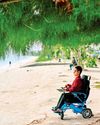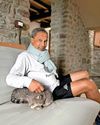
The Indian team mentor said that the players had been receiving adequate support from the government and that they should “take responsibility” for their performances.
In an interview with THE WEEK, the former All-England champion stood by his statement, and pointed to Neeraj Chopra and Manu Bhaker as examples of athletes who take responsibility. He also spoke about another Olympics for P.V. Sindhu, and what’s ahead for Indian badminton. Excerpts:
Q/ This is the first time since 2012 that badminton has not given India an Olympic medal.
A/ I was expecting at least two medals. This could have come from our men’s singles, women’s singles or men’s doubles players. The fact that we did not get even one medal definitely disappointed the entire nation, including me.
Q/ You spoke about athletes taking responsibility for their performances. What did you think about the reaction to that statement? The sporting world seemed divided.
A/ I have done my job as a well-wisher of Indian sport to start a dialogue. I do not gain anything personally by commenting on the players. I have only stated a fact. I am also aware that most players will not agree with my views. They are entitled to their opinion. Even if four or five players across different sports take my advice in the right spirit, I would have achieved my objective. If not, we can continue to be happy with single-digit medals at the Olympics or even fourth-place finishes.
هذه القصة مأخوذة من طبعة September 08, 2024 من THE WEEK India.
ابدأ النسخة التجريبية المجانية من Magzter GOLD لمدة 7 أيام للوصول إلى آلاف القصص المتميزة المنسقة وأكثر من 9,000 مجلة وصحيفة.
بالفعل مشترك ? تسجيل الدخول
هذه القصة مأخوذة من طبعة September 08, 2024 من THE WEEK India.
ابدأ النسخة التجريبية المجانية من Magzter GOLD لمدة 7 أيام للوصول إلى آلاف القصص المتميزة المنسقة وأكثر من 9,000 مجلة وصحيفة.
بالفعل مشترك? تسجيل الدخول

Walking in pine forest can have the same effect as a prescription drug
INTERVIEW - KATHY WILLIS, professor of biodiversity, the University of Oxford, and author, Good Nature

MORE THAN A HELPING HAND
Maria Victoria Juan spent a lifetime healing wounded soldiers, and she can't think of anything she could have done better

Against all odds
Mohamed Raishan Ahmed was born with spinal muscular atrophy, which made him unable to sit, stand or walk. Recently, the Maldivian underwent a rare, complex surgery in India that now allows him to sit upright. At 23, the fact that he is alive is in itself an achievement. But he has gone beyond mere survival-with a pursuit of excellence

A pacemaker tale
From science fiction to reality, with a touch of southern Indian wisdom

Driving safe
Taxi drivers endure gruelling hours, cramped seats and relentless traffic, making them prime candidates for health issues like back pain, hypertension, diabetes and insomnia.

Good food, good life
From the moment of birth, we establish a relationship with food—a nourishing link that requires care and attention to stay healthy

POOR SLEEP IN MIDLIFE COULD AGE YOUR BRAIN FASTER
PEOPLE WHO EXPERIENCE SLEEP ISSUES, such as difficulty falling asleep or staying asleep in their 40s, may show more signs of brain ageing in late midlife. Poor sleep may accelerate brain atrophy that is associated with dementia.

BRAIN SCANS SHOW MINDFULNESS MEDITATION CAN REDUCE PAIN
CAN MINDFULNESS MEDITATION actually relieve pain, or is it just a placebo effect?

NON-SURGICAL OPTION TO EASE KNEE ARTHRITIS
A NEW, MINIMALLY INVASIVE procedure called genicular artery embolisation (GAE) can effectively reduce pain, improve quality of life and reduce progression of the disease and the need for knee replacement surgery in people with knee osteoarthritis.

EARLY ONSET DIABETES, BELLY FAT LINKED TO DEMENTIA
FACTORS SUCH AS DIABETES and belly fat in midlife can put you at risk of dementia and Alzheimer's disease later in life.